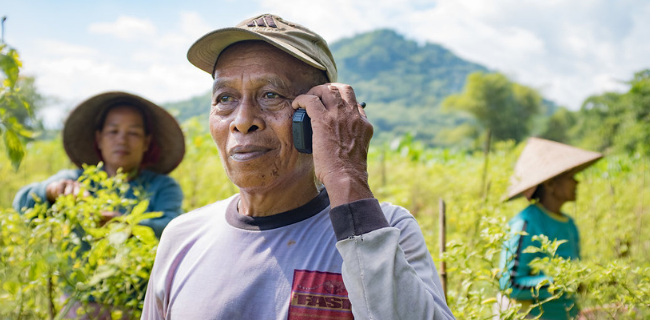Since April 2017, the GSMA mAgri programme has shifted its strategic direction. From supporting the launch and scale of agricultural value-added services (Agri VAS) delivering information directly to farmers in developing countries, the programme is now focusing on digitising agricultural value chains.
In this new phase, we are working with MNOs and their agribusiness partners to implement a range of business-to-business-to customer (B2B2C) services that use key mobile operator assets such as mobile money and digital ID. In its last iteration, under the mNutrition Initiative funded by UK aid (the UK Department for International Development, DFID), the mAgri programme worked with six MNOs and a CABI-led consortium of Global and Local Content Providers responsible for the creation of content fit for dissemination on any of the MNO-led platforms.
This agricultural content is now publicly available to any organisation interested in improving the quality of their mobile-based information services targeting the rural segment and contributing to Sustainable Development Goal (SDG) 2, Zero Hunger. It may also raise interest among agriculture ministries, extension officers, community workers, NGOs and development practitioners.
What topics does the mNutrition content cover?
Under the mNutrition Initiative, content was developed for two Sub-Saharan African countries (Ghana and Malawi) and four South Asian countries (Bangladesh, Myanmar, Pakistan, Sri Lanka) for a selection of crop and livestock topics. The content aims to address knowledge gaps and improve behavioural practices to reduce malnutrition in the implementing countries of the mNutrition Initiative. It builds on defined nutrition-sensitive agriculture pathways specific to each country. For example, while content developed for Malawi covers crops such as cassava, sorghum and amaranth, content developed for Sri Lanka involves a different mix of more relevant crops.
For each crop, the content covers core crop production and plant protection topics. For example, crop production topics may include content on land preparation, water management and crop requirement, among others, while plant protection topics address insect and disease description and management. Besides these core topics, food information content is also available for certain countries and crops.
What is the format of the mNutrition content?
National nutrition or agriculture partners, such as government, have validated the content, which is available in crop-specific factsheets, associated messages and, on some occasions, voice recordings. Factsheets are technical documents, which provide information on a combination of global and local level recommendations around a given agricultural intervention, process or management technique.
They collate material sourced from a range of local and international sources such as academic journals, books or verbal discussions with experts and are the base material for subsequent creation of messages for dissemination to the end users via an Agri VAS. Messages appear in two character limits, each suitable for dissemination over SMS or voice messages following stylisation (e.g. for hosting on an IVR mobile service). Factsheets are available in English while messages are available in English and/or local language(s), depending on the country for which the content was created.
What principles were employed in the creation of the mNutrition content?
Local teams created the content locally, taking into account the local agro-climatic conditions. This drive for localisation emerged as essential at the start of the mNutrition Initiative and often resulted in content incorporating local agricultural practices and taking into account local crop calendars. For example, sowing of rice recommendations in Sri Lanka differ from those in Bangladesh or Myanmar thus reflecting the crop lifecycle that is particular to the South Asian island. Besides localisation, the mAgri team worked closely with the mNutrition content providers to introduce systems and processes that ensure high content quality measured along the principles of actionability, clarity, geographical relevance, timeliness and usefulness.
I am interested in the mNutrition content, what do I do?
All agricultural content created under the mNutrition Initiative currently resides on Dropbox and is available to interested parties free of charge under a creative commons licence CC-BY.
This content has already reached over 10 million registered farmers across the six mAgri services supported under the mNutrition Initiative.
If you are interested in obtaining this content or if you want to tell us about the scale and impact of services in your region, please contact us at [email protected]



